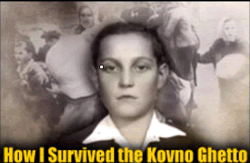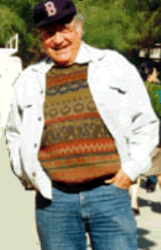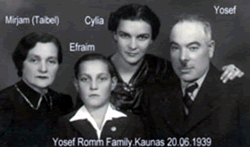http://www.aish.com/holocaust/people/How_I_Survived_the_Kovno_Ghetto.asp
On June 22, 1941, I was 15 years old. I was a high school student in one of the four Hebrew high schools in Kovno, the capital of Lithuania. Our community also had a Jewish theater, a Jewish hospital, a Jewish orphanage, two daily Jewish newspapers, numerous synagogues, a Jewish technical college, one of the most well known yeshivas in the world (Slobodka), and many other community organizations, such as Jewish burial services, Jewish fellowships for assisting the poor, kosher restaurants, etc.
The Jewish community in Kovno had about 40,000 members and constituted 25 percent of the population in the city. Many of its members were professionals, including some of the country's leading doctors, lawyers and business people. Other members of the community were skilled artisans, merchants, small business owners and laborers. All major political sections within the Jewish community had organizations and youth clubs in the city, including, the Zionists, the socialists, and the various religious denominations.
The first day of the war found me in a small town called Balbirishok, which was located about 40 kilometers south of Kovno. My brother Arie, his wife Rebecca, and their 3-year-old daughter, Esther, lived there. Since it was the end of June and I was on summer vacation, my father and I decided to spend some time with my brother and his family. My mother was visiting my older sister, Celia, who had just gotten married and moved with her husband to Vilna, the largest city in Lithuania.
June 22 was a Sunday. What does a 15-year-old boy do on a Sunday morning on his summer vacation? In my case, I went fishing in the nearest river. After about two hours of less than successful fishing, I suddenly heard the sound of distant bombing that didn't exactly fit the pastoral environment around me. I decided to pack up my fishing gear and run home.
|
|
|
|
We walked four days to get home. |
|
|
|
|
When I got home, it was clear that the war has started. My father decided that we should go back to our home in Kovno as soon as possible. Public transportation was no longer available, so my father and I started walking back. The roads were packed with German armored trucks on their way east, and poor us, were walking slowly, with all our belongings on our backs on the road to Kovno. It took us four days to get home. About a week later, my brother Arie and his wife and daughter arrived in Kovno and joined us.
By the time my brother and his family joined us in Kovno, the city
was fully occupied by the Germans. We heard about the massacres that
the Lithuanians have undertaken against the Jewish population in the
city and the surrounding areas, so we stayed at home and didn't go
out at all for a while. We lived on food that we prepared in the house
ahead of time.
Within days, the German occupiers had placed posters in public places around the city announcing that the Jewish people have to wear a yellow star on their clothes and that they are not allowed to walk on the sidewalk. Shortly afterwards, there were new posters announcing that the Jews are to leave their homes and move to one of the poorest suburbs of the city, Slobodka, where the Jewish Ghetto was to be established. We had to move before August 1, which gave us only a few weeks to prepare.
Moving into the Ghetto
This is how we found ourselves in the Kovno Ghetto, with a few clothes and a few pieces of furniture that we managed to take from our large house. In the Ghetto, we found ourselves in a tiny flat with two other families, with barbed wire and soldiers guarding us day and night. Our flat in the Ghetto was near the fence, not far from the synagogue and from the major entrance gate.
The synagogue was never used for prayer. The Germans organized classical music concerts there. They didn't have a problem finding musicians and other artists in the Ghetto. So I had the opportunity to listen to classical music of the highest quality right outside my home and I took advantage of this at every opportunity.
|
|
|
|
The food ration was 200 grams of bread per person per day, and 100 grams of horse meat once in two weeks. |
|
|
|
|
Life in the Ghetto was not easy, to say the least. The food that was distributed to us was meager, 200 grams of bread per person per day, 100 grams of horse meat once in two weeks, and occasionally, a kilogram of potatoes. We starved most of the time and so it is no wonder that the black market flourished. This market was based on provisions smuggled into the Ghetto by those who worked outside the Ghetto during the day. We didn't have any money, so we exchanged gold coins, clothes, household items and anything else that the non-Jews outside the Ghetto were willing to take in exchange for food. Working outside the Ghetto was advantageous despite the harsh conditions and misery associated with it. You had to be up in front of the entrance to the Ghetto at 5 a.m. where the Appel (the counting and organizing into work groups) was taking place. About an hour after the Appel, in freezing cold, the work groups started to leave through the gate, accompanied by soldiers.
We walked slowly through the city on our way to various work places. We walked on the street, with the German soldiers walking on the sidewalk. Every Jewish person had a yellow star on his or her chest and on his or her back. As a matter of principle, Jews were not allowed to walk anywhere but on the street, with the horses. The yellow star had to be worn on one's clothes at all times, and a German was to guard the Jews at all times.
The work places we went to were quite varied. There was hard digging in the airport at Aleksot, and maintenance work for German soldiers around the city. The most sought after places were those where one could have some contact with the local population. Such contact was an opportunity to exchange valuables and clothes for food.
Returning to the Ghetto at night was an ordeal. Again, we would walk slowly in a group, accompanied by German soldiers. This time, however, we would be stopped at the gate to be searched. The Jewish police at the gate would allow a small amount of food for personal use, but anything beyond this was confiscated.
The normal procedure was that just before the gate, one would have
to take off his hat, open his bag and raise his hands so the guard
could check him. My father had an ingenious idea that allowed him
to trick the guard. He would open his coat and raise his arms, holding
his hat in one hand. They never found anything on him. After the checkup,
he would take half a kilo of butter out of his hat. Half a kilo of
butter was worth more than 20 kilos of potatoes on the black market.
This would be enough food for us to live on for weeks.
There was another advantage to going out to work. As time went by, we discovered that the Germans took advantage of the fact that some of the Ghetto's inhabitants were out at work to round up people for executions (Aksionnen). Those who were out working were safer and less likely to be seized than those who stayed in the Ghetto during the day.
Building a Hiding Place
Soon enough we realized that it was essential to build a hiding place. We called the hiding place "Maline." When the Germans announced that certain houses were to be evacuated and the inhabitants rounded up for selection -- which would be followed by execution -- it was important to have a hiding place. This is what happened during the great Aksionnen of October 1941, which resulted in half the Ghetto's population beyond Panerio Street being liquidated.
Because of the crowded living conditions, it was important to build the hiding place in total secrecy and to equip it with electricity, a toilet, and enough food for a long stay. How can one do this when there is another family living in the next room? Well, in our small room, we moved the sofa, and underneath we opened a small square hole in the wooden floor, about the width of one's shoulders. From this opening, my father and I started to take dirt out.
But then, how does one get rid of the extra dirt without anyone noticing? We managed to find a vacant cellar nearby and started filling it with dirt. We worked for many nights, very quietly so our neighbors and the soldiers guarding the fence just outside the house would not notice anything. Given that we lived right near the fence, this was quite an achievement.
|
|
|
|
Our spider hole was equipped with electricity, a toilet, and enough food for a long stay. |
|
|
|
|
After many nights of working on the hiding place (after which we would go to work in the morning as usual), our hiding place was ready and fully equipped. Our plan was to use it not just while the Ghetto was in existence but also for the time when the Germans may decide to liquidate the Ghetto. The idea was to hide until the Russians came.
Actually I prepared a second, alternative hiding place. At the time, I was working with my father on Putvinskio Street. We worked for a German military unit that provided services to other units in the region. My father, who was a master electrician, made me his assistant. This allowed me to work with him and learn the profession from him.
The Germans established a small workshop for him in one of the huts, and this was his kingdom. No one ventured into it. So, we decided to open a hole in the ceiling, and in the gap between the ceiling and the roof, we built a small room from wooden boards. We equipped the room with everything that might be needed for a long stay, including a stove and wood for heating. We made sure that our hiding place had a second, alternative entrance, with a ladder that was always hanging outside in case there was no way of entering the hiding place from inside the workshop. Again, the idea was that this second hiding place could be used if we had to leave the Ghetto, and then we would be able to hide among the non-Jews in the city.
Russian Advance
This was not the last hiding place that we built. Later on, when the Russians advanced closer to the city, the Kovno Ghetto became a concentration camp under the management of the German commander, Goeke. This meant that those who worked outside the Ghetto were housed in small camps closer to their work places.
As a result of this, our family was separated. My parents were housed in camps outside the Ghetto, while my brother's family and I were moved to one of the huts inside the Ghetto. All the work that we invested in building our first hiding place came to nothing...
The Germans were already withdrawing from Russia and we had no idea what was to happen. There was an urgent need to build a new hiding place. Since there was a pantry at the entrance to our hut, I decided to make a hole at the top of that pantry that would allow us to get into the gap between the ceiling and the roof. It was impossible to stand in that area, but one could sit or lie down there. I organized a sleeping place there and installed some equipment. It was impossible to get electricity there.
There were rumors that the Germans were withdrawing and that the front with the Russians was getting close. We didn't know what was really happening. Right at the very beginning of the Nazi occupation, the Germans announced that no one was allowed to listen to short wave radio. The whole population had to give up their short wave radios, and, instead, the authorities provided small radios that could only access local, censored channels. Jews were not allowed to have any radios at all. So all the news we heard came from the Lithuanians we met at our work places.
In the Ghetto, the Germans would occasionally search for young people who were not working. The searches were usually carried out at night. When they found such young people, they would take them away and they were never heard from again. So I had no choice but to sleep at night in my hiding place. It wasn't much fun, but there was no other way.
Other than the searches at night, the Germans would also have sudden Aksionnen during the day. One of these was the children's Aksionnen in which they collected all the small children who were still alive in the Ghetto and executed them in the Ninth Fort (an area near the Ghetto where most of the Ghetto's inhabitants were killed during the three years the Ghetto was in existence). So we decided to get Esther, my brother's daughter, who was five years old at the time, into the hiding place during the children's Akstionnen. This saved her life, for then. At the end, when the Ghetto was liquidated, my brother, his wife and their daughter were all killed.
For the rest go to;
http://www.aish.com/holocaust/people/How_I_Survived_the_Kovno_Ghetto.asp
Romm Arie
|
Arie Romm was born in Kovno, Lithuania in 1910 to Yosef and Miriam. He was an electrician and married to Rivka nee David. Prior to WWII he lived in Kovno, Lithuania. During the war was in Kovno. Arie died in 1944 in Kovno, Lithuania. This information is based on a Page of Testimony submitted on 23/09/1955 by his brother Ephraim in Beer Sheva |
Rom Rivka
|
Rivka Rom nee David was born in Kretinga, Lithuania in 1913. She was a housewife and married to Arie. Prior to WWII she lived in Kowno, Lithuania. During the war was in Kowna. Rivka died in 1944 in Kowna wirth her five years old daughter; Esther. This information is based on a Page of Testimony submitted on 23/09/1956 by her brother-in-law Ephraim in Beer Sheva |
Boris
Heller
|
Boris was born in Vilna, Poland in 1916. He was a violinist and married to Tzila nee Rom. Prior to WWII he lived in Vilna, Poland. During the war was in Vilna, Poland. Boris died in 1941 in Ponary, Poland. This information is based on a Page of Testimony submitted on 23/09/1955 by his brother-in-law Ephraim in Beer Sheva |
Heler Cila
|
Cila Heler nee Romm was born in Kaunas, Lithuania in 1921 to Yosef and Miriam. She was a clerk and married to Boris. Prior to WWII she lived in Kaunas, Lithuania. During the war was in Wilno. Cila died in July of 1944 in the H.K.P camp in Wilno, as the Soviet were about to liberate the area. This information is based on a Page of Testimony submitted on 23/09/1955 by her brother Ephraim in Beer Sheva |
Naphtalowitz Miriam
|
Miriam Naphtalowitz nee Taibel was born in Kowna, Lithuania in 1908 to Hirsh and Khava. She was a housewife and married to Moshe. Prior to WWII she lived in Kowna, Lithuania. During the war was in Kowna. Miriam died in 1941 in Kowna with her five years old son; Hirsh. This information is based on a Page of Testimony submitted on 23/09/1955 by her cousin Ephraim in Beer Sheva |
Naphtalowitz Moshe
|
Moshe Naphtalowitz was born in Lithuania in 1905. He was a tailor and married to Miriam nee Teibel. Prior to WWII he lived in Kaunas, Lithuania. During the war was in Kaunas. Moshe died in 1941 in Kaunas. This information is based on a Page of Testimony submitted on 23/09/1955 by his relative Ephraim in Beer Sheva |


